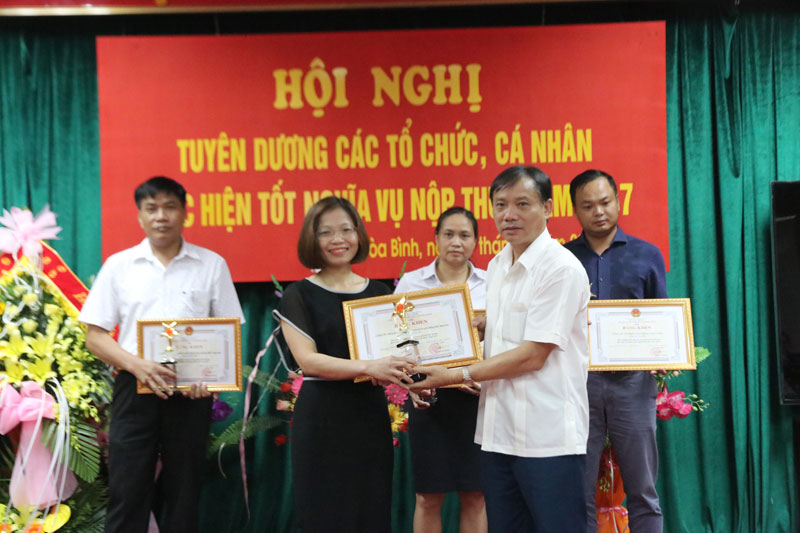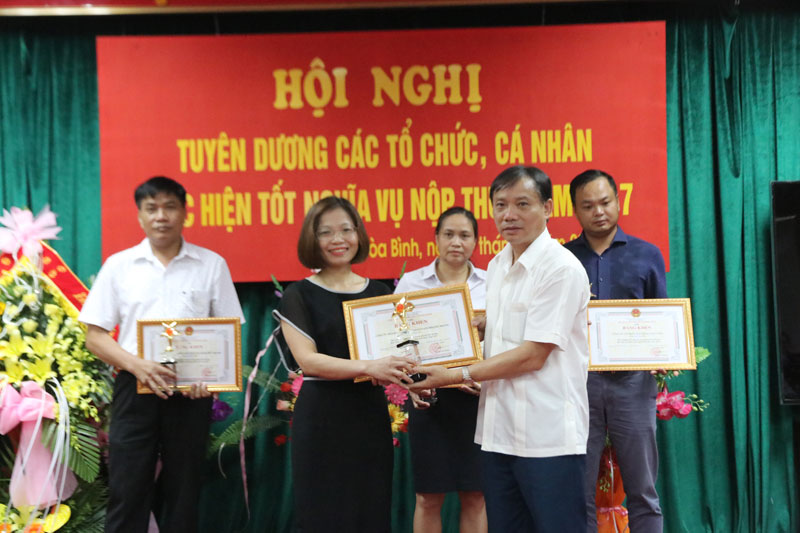
(HBO) - The Taxation Department of Hoa Binh province held a conference to honour 72 organisations and individuals who have well implemented tax policies and laws in 2017. Vice Chairman of the provincial People’s Committee Bui Van Khanh attended the event.

Vice Chairman of the provincial People’s Committee Bui Van Khanh
presents certificates of merit of the Ministry of Finance to representatives
from enterprises that exemplarily performed tax obligation in 2017.
In 2017, thanks to great efforts of all
the sectors, the province’s budget revenue successfully reached the target of
over 3 trillion VND, achieving 117 percent of the sum assigned by the
Government.
According to the provincial Taxation Department, the positive result is
attributed to great contributions of local enterprises which overcame
difficulties and challenges, and made every effort to promote their production
and business, thus bringing about economic efficiency.
Local businesses have good performance of
tax obligations, contributing to maintaining steady growth of the annual State
budget collection.
Of the 72 organisations and individuals honoured at the event, two enterprises were awarded certificates of merit by the Minister of Finance; and four by
the Chairman of the provincial People's Committee.
In addition, dozens of enterprises and business households were presented with
certificates of merit by the General Director of the General Department of
Taxation and the local Taxation Department.
The Hoa Binh Hydroelectric Company is the
most prominent enterprise in implementing tax obligations in 2017. The firm
contributed 1.36 trillion billion VND to the State budget, accounting for 44.4
percent of the province's total budget revenue in the year.
Other enterprises with great contributions
to the province’s budget revenue were Hoa Binh petroleum branch; Phuong Hoang
Golf Course Co., Ltd; Doosung Tech Vietnam Co., Ltd; Japfa Comfeed Vietnam Co.,
Ltd; Vinh Son Cement Co., Ltd; Vinconex Water Supply JSC; An Tinh Hoa Binh JSC;
and Son Thuy JSC.
Speaking at the conference, Vice Chairman
of the provincial People’s Committee Bui Van Khanh praised local enterprises
and business households in performing tax policies and laws, saying that they
made significant contributions to the State budget in 2017.
According to data from the Hoa Binh Provincial Party Committee, the industrial production index for the first six months of 2025 is estimated to have increased by 20% compared to the same period last year. This marks the highest year-on-year growth rate for this period since 2020.
In the first six months of 2025, Hoa Binh province’s export turnover was estimated at 1.145 billion USD, marking an 18.11% increase compared to the same period in 2024. Import turnover was estimated at $ 804 million, a 17.15% increase, which helped the province maintain a positive trade balance.
The lives of the ethnic minority farmers in Tan Lac district have gradually improved thanks to the new directions in agricultural production. This is a testament to the collective strength fostered through the professional associations and groups implemented by various levels of the district’s Farmers’ Union.
With the motto the "product quality comes first,” after nearly one year of establishment and operation, Muong village’s Clean Food Agricultural and Commercial Cooperative, located in Cau Hamlet, Hung Son Commune (Kim Boi district), has launched reputable, high-quality agricultural products to the market that are well-received by consumers. The products such as Muong village’s pork sausage, salt-cured chicken, and salt-cured pork hocks have gradually carved out a place in the market and they are on the path to obtaining the OCOP certification.
In the past, the phrase "bumper harvest, rock-bottom prices" was a familiar refrain for Vietnamese farmers engaged in fragmented, small-scale agriculture. But today, a new spirit is emerging across rural areas of Hoa Binh province - one of collaboration, organisation, and collective economic models that provide a stable foundation for production.
Maintaining growing area codes and packing facility codes in accordance with regulations is a mandatory requirement for agricultural products to be eligible for export. Recently, the Department of Agriculture and Environment of Hoa Binh province has intensified technical supervision of designated farming areas and packing facilities to safeguard the "green passport" that enables its products to access international markets.



